|
|
|
Sort Order |
|
|
|
Items / Page
|
|
|
|
|
|
|
| Srl | Item |
| 1 |
ID:
125195


|
|
|
|
|
| Publication |
2013.
|
| Summary/Abstract |
The Pacific War ended in 1945 before the American government had established a plan for the implementation of its postwar goals for its relationship with China. Although China lacked unification, the Guomindang (GMD), the "allied" government, sought to create a more modern military along American lines, with American equipment, using American advisers and funding. GMD leaders did not want American influence or control, desiring to maintain their culturally organized structures and ways of functioning, including the use of guanxi (personal networks and favors). The Joint U.S. Military Advisory Group attempted to operate within this nexus of conflicting goals, purposes, and missions.
|
|
|
|
|
|
|
|
|
|
|
|
|
|
|
|
| 2 |
ID:
125192


|
|
|
|
|
| Publication |
2013.
|
| Summary/Abstract |
This essay explores the impact of late Victorian cultural assumptions on the conduct of the South African War of 1899-1902, both at home and on the battlefield. It contends that three cultural values, intrinsic to late Victorian culture--cosmopolitanism, political egalitarianism, and race--shaped British soldiers' sense of justice at the outset of the war and, as a result, influenced their actions on and off the battlefield. This article emphasizes that the numerous "small wars" fought by British armies in the late nineteenth century, of which the South African War was the largest, were each unique and worthy of study not just as political history but as cultural military history
|
|
|
|
|
|
|
|
|
|
|
|
|
|
|
|
| 3 |
ID:
125193
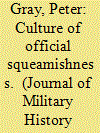

|
|
|
|
|
| Publication |
2013.
|
| Summary/Abstract |
Although it waged the largest and most costly of Britain's Second World War campaigns, RAF Bomber Command was not mentioned in Prime Minister Churchill's 1945 Victory Speech and its Commander-in-Chief, Air Chief Marshal Sir Arthur Harris, was left off the Victory Honours List. The crowning insult to Bomber Command veterans was the lack of a campaign medal for the strategic air offensive. This article uses case studies of the campaign medal saga, still very much alive today, and the perceived reluctance of the wartime Air Ministry to acknowledge the RAF's resort to area bombing to test the argument of some historians that this slight of Bomber Command was due to "official squeamishness" in the Air Ministry and elsewhere in the government in the aftermath of the bombing of Dresden.
|
|
|
|
|
|
|
|
|
|
|
|
|
|
|
|
| 4 |
ID:
125190


|
|
|
|
|
| Publication |
2013.
|
| Summary/Abstract |
In terms of modern military historiography, the International China Expeditionary Force (CEF) of 1900-1 is a largely forgotten army. This is wholly undeserved. Based on British, German, Indian and United States Army and other records, this article examines its operations as an overseas counter-insurgency campaign. It also examines the problematic nature of Field Marshal von Waldersee's 'Supreme Command' and the complex relations between the various national contingents of this, the only active military alliance between the Crimean conflict and the First World War. Ultimately, the CEF was an interesting, if flawed, late nineteenth-century experiment in coalition warfare. But it was more than just that. It was also a microcosm that makes evident the problems of turn-of-the-century international politics.
|
|
|
|
|
|
|
|
|
|
|
|
|
|
|
|
| 5 |
ID:
125191
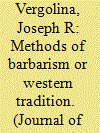

|
|
|
|
|
| Publication |
2013.
|
| Summary/Abstract |
The historical significance of the Second Anglo-Boer War (1899-1902) has traditionally suffered from the conflict's chronological proximity to the Great War. Compared to the industrial slaughter of 1914-1918, the military extremism employed in the South African conflict has gone largely unanalyzed. A close examination of British military policies during the Second Boer War shows that the resort to escalatory violence sprang from frustration at the elusiveness of decisive battle, deemed vital to shore up Britain's position as the world's sole superpower, and was sanctioned by a Western tradition of unrestricted violence towards peoples like the Boers who pursued unconventional battlefield strategies.
|
|
|
|
|
|
|
|
|
|
|
|
|
|
|
|
| 6 |
ID:
125189
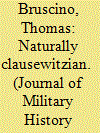

|
|
|
|
|
| Publication |
2013.
|
| Summary/Abstract |
American military theorists between the Civil War and World War II have garnered limited attention in military history, but they developed many ideas about the nature and practice of war. These theorists did not fixate on the writings of Carl von Clausewitz, but they were familiar with his work. But independent of Clausewitz, American military theory emphasized the Clausewitzian concept of the relationships among politics and society in preparing for and fighting wars. This article explores Clausewitz and American military theory, explains how Americans became naturally Clausewitzian, and discusses what their thinking has to do with the conduct of war.
|
|
|
|
|
|
|
|
|
|
|
|
|
|
|
|
| 7 |
ID:
125150
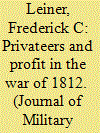

|
|
|
|
|
| Publication |
2013.
|
| Summary/Abstract |
During the War of 1812, American privateers captured more than 1,000 British merchant ships as "prizes." Because privateers were privately owned, and sought profit, not glory, in combat, an obvious question is whether they made money. Perhaps surprisingly, determining the profitability of privateers is difficult. Even early in the war, privateer owners petitioned Congress to make privateering profitable by lowering customs duties. Their complaints led two treasury secretaries to use economic theory to try to understand the economic incentives for privateering. Twice, Congress made decisions guided by competing theories, ultimately lowering customs duties, yet apparently the subsidy did not increase the number of prizes brought into U.S. ports.
|
|
|
|
|
|
|
|
|
|
|
|
|
|
|
|
| 8 |
ID:
125210
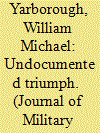

|
|
|
|
|
| Publication |
2013.
|
| Summary/Abstract |
the incomplete nature of operational records generated during and pre served after the Persian Gulf war (1990-91) has and will continue to challenge historians', medical researchers and veterans' understanding of the conflict. The war exposed the deterioration of the US Army's records management and the disestablishment of The Adjutant General's Office - TAGO in 1986. TAGO had overseen army records management, holding commanders accountable for their units records and using trained personnel to manage records within units. Focusing on operational records, this paper explores the breakdown of records management during the Gulf war, discussed the presidentially mandate Gulf war declassification project (1995-96) and briefly reviews current army operational records management.
|
|
|
|
|
|
|
|
|
|
|
|
|
|
|
|
| 9 |
ID:
125202
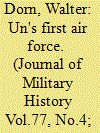

|
|
|
|
|
| Publication |
2013.
|
| Summary/Abstract |
The United Nations Operation in the Congo (ONUC) was created in July 1960 to help the Congolese government quell its army mutiny and reestablish order. After ONUC's mandate was expanded in 1961 to stop the Katanga province's secession, a shooting war developed, in which Katanga paralyzed UN operations with a single armed jet. An aerial "arms race" and open combat followed. In December 1962 ONUC implemented Operation Grand Slam: Swedish jets neutralized Katanga's air force, and the UN's coordinated air-ground manoeuvers forcibly ended the secession. This article uncovers the unprecedented case of air power in UN peacekeeping and evaluates it for twenty-first century lessons.
|
|
|
|
|
|
|
|
|
|
|
|
|
|
|
|
|
|
|
|
|